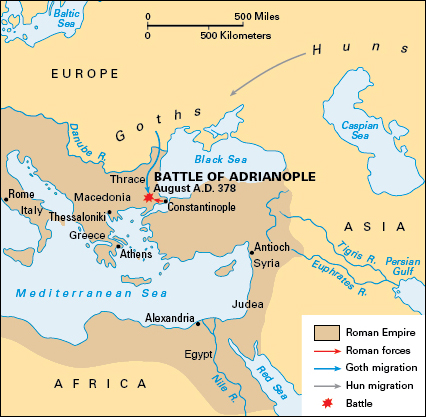Gratian, << GRAY shuhn, >> (A.D. 359-383) was a co-emperor of Rome from A.D. 367 to 383. Wars with Germanic peoples called Goths troubled his reign. Gratian was a passionate Christian. He ordered the removal of the altar of Victory, a Roman goddess, from the Senate house in Rome. Gratian also renounced his title of pontifex maximus, a high-ranking traditional religious title.

Gratian was born in 359 at Sirmium (now Sremska Mitrovica, Serbia). He was the son of Valentinian, a military officer who became the emperor Valentinian I in 364. As a pupil of the poet Ausonius, Gratian showed a marked respect for traditional Roman culture, education, and values. Under the influence of Saint Ambrose, the bishop of Milan, Gratian also became deeply devoted to Christianity.
In 367, when Gratian was eight years old, he officially became co-emperor with his father. In 374, he married Constantia, the daughter of the former emperor Constantius II. When Valentinian died in 375, Gratian succeeded him.
In 378, Roman forces suffered a disastrous defeat by the Goths at the Battle of Adrianople (now Edirne, Turkey). Gratian’s most pressing concern then became expelling the Goths from Rome’s Balkan provinces. He appointed Theodosius, an experienced military officer and the son of Valentinian’s most brilliant general, to undertake this task. In 379, Gratian promoted Theodosius to the position of co-emperor.
While Theodosius fought the Goths, Gratian struggled to defend Rome’s upper Danube provinces and Gaul (now mainly France) from invaders called the Alemanni. In 383, soldiers commanded by Magnus Maximus overthrew and killed Gratian. Maximus was the commander of Roman forces in Britain.
